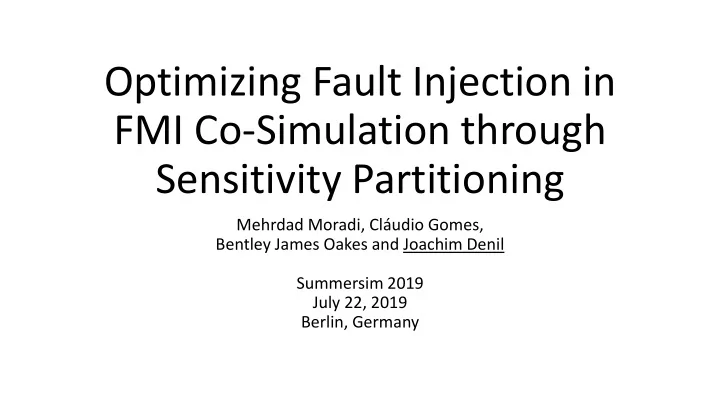

Optimizing Fault Injection in FMI Co-Simulation through Sensitivity Partitioning Mehrdad Moradi, Cláudio Gomes, Bentley James Oakes and Joachim Denil Summersim 2019 July 22, 2019 Berlin, Germany
Outline • Introduction • Context and fault injection • Power window use case • Model and specifications • Co-simulation • Technique • Interval partitioning and sensitivity analysis • Simulation • Summary and next steps 2
Introduction Cyber-Physical System (CPS) • Increasing complexity • Increasing application Error prone and critical • Test and simulate system https://bit.ly/2zO8l2G 3
Introduction Why? • Understand system behavioral • Safety • Robustness • Detect failure mode and errors • Repaired Fault Injection What? Testing method which aids in understanding how [virtual/real] system behaves when stressed in unusual ways 4
Fault injection How? • In the level of model • Library of faults considering fault’s nature • latency • Stuck to value Research problem • Faults are uncertain • Limit fault space • Using sensitivity analysis • Benso, A. and Prinetto, P. eds., 2003. Fault injection techniques and tools for embedded systems reliability evaluation (Vol. 23). Springer 6 Science & Business Media.
Motivating example Power window Specifications: • Hybrid system 1. Fully opened/closed within 4s 2. Force to detect when an object is present should be less than 100 [N] Safety-critical system due to possibility of object being crushed 7
Motivating example - Structure 8 https://www.mathworks.com/help/simulink/ug/power-window-example-case-study.html
Motivating example – Normal behavior Specifications: 1. Fully opened/closed within 4s 2. Force to detect when an object is Holding the present should be less than 100 [N] up switch Object detected Ctrl ignores spike Current Position Without Object With Object 10
Motivating Example – Fault A power window is affected when the rubber slips into the window Uncertainty in: when the rubber falls; and how much friction there is. 11
Example fault - Rubber friction p =100% p =140% Friction parameter p Top is in [100%, 200%] Different values of p Window lead to different Position behaviors of the p =180% p =160% window 4 s Time 12
Co-simulation Co-simulation - defined in Functional Mock-up Interface (FMI) • Heterogeneous system • High level of fidelity • Free from IP concerns • Increasing standardization and adoption by industry 13 https://fmi-standard.org/
Research problem in the fault injection • Given a co-simulation, a library of faults, and system specifications • Provide user with an intuition about how the fault parameters affect the behavior • Possibly violating specifications 15
Injecting faults into co-simulation 2. Force to detect Virtual FMU when an object is present should be less doStop() than 100 [N] setReal() getReal() results Fault Switch Controller Window Specification p Assumption : Stable and Interval Sensitivity partitioning analysis accurate master algorithm 16
Fault Parameter interval partitioning p Example naive procedure: Up Mode Sequence 1. Let fault parameter p in interval Top [100%,200%] p in [100%,150%) 2. Partition the interval into N points, UpDownUpDown • run a co-sim per point, Mode Sequence Window • store sequence of modes Position 3. Group adjacent points with same When p is (150%, 200%], behavior sequence of modes to form changes due to faulty object detection equivalence classes of continuity 4. Time 17
Sensitivity analysis Want to determine how a change in our fault parameter affects the output of the specification ... Specification F p + Delta p Fault Within the same equivalence interval 100% - 150% 150% - 200% p Specification Output p 150% 200% Specification Violation 19
Simulation • Object is present • Change of the rubber slip out’s time • Causes the window to: To crush the object 20
Armature current Window’s position Rubber friction Force 21
Armature current Window’s position Rubber friction Force 22
Armature current Window’s position Rubber friction Force 23
Armature current Window’s position Rubber friction Force 24
Armature current Window’s position Rubber friction Force 25
Armature current Window’s position Rubber friction Force 26
Armature current Window’s position Rubber friction Force 27
Armature current Window’s position Rubber friction Force 28
Armature current Window’s position Rubber friction Force 29
Armature current Window’s position Rubber friction Force 30
Summary • Applying fault injection to FMI • Using sensitivity analysis to relate system trajectories to fault parameters Next steps • Co-simulation effect • Delay due to step-size • How to observe discrete modes of the hybrid system in FMI standard • How to compute intervals more effectively • Sensitivity equations 31
Thank you for your attention 32
Recommend
More recommend